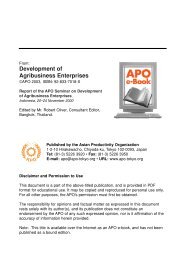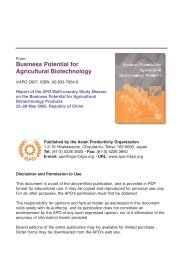Annual Report 2009 - Asian Productivity Organization
Annual Report 2009 - Asian Productivity Organization
Annual Report 2009 - Asian Productivity Organization
You also want an ePaper? Increase the reach of your titles
YUMPU automatically turns print PDFs into web optimized ePapers that Google loves.
A research project on the subject was conducted in<br />
2007 and 2008 by experts from eight member countries.<br />
To review and disseminate the research findings,<br />
the APO organized a follow-up workshop on the Development<br />
of Competitive Supply Chains in Agribusiness<br />
in Vietnam, 23–27 November. The objective was<br />
to review the supply chain models researched for their<br />
replication/adaptation; and to examine the findings<br />
of the previous research for wider dissemination. The<br />
VPC implemented the program. Eighteen participants<br />
from nine member countries and two resource persons<br />
attended.<br />
Program coverage: Developing competitive supply<br />
chains in the Asia-Pacific region; Successful and<br />
sustainable agribusiness supply chains; Review and<br />
analysis of the models of agribusiness supply chains<br />
researched; Review of the preceding research findings<br />
and synthesis research report; and Formulation of<br />
recommendations and action plans. A half-day visit to<br />
a VietGAP-certified vegetable farm was conducted.<br />
Strengthening Small Farmer and Agribusiness Linkages<br />
for Enhancing Agricultural <strong>Productivity</strong> and<br />
Agribusiness Competitiveness<br />
Globalization and market liberalization are increasingly<br />
changing the market environment for agricultural<br />
and food products. These changes are posing greater<br />
challenges to small farmers and small and mediumsized<br />
agribusiness enterprises in <strong>Asian</strong> developing<br />
countries. Therefore some farms and business firms<br />
have established various types of business linkages to<br />
strengthen their competitiveness, including contracts<br />
between farmers and retailers to maintain a stable<br />
supply of agricultural products and collaboration<br />
between farmers and food-processing companies to<br />
develop new types of processed food. Food-processing<br />
companies may also provide seeds, fertilizer, and technical<br />
guidance to farmers to improve the quality of the<br />
products it purchases. A number of useful examples<br />
that have mutually benefited both small farmers and<br />
agribusiness enterprises can be observed in APO<br />
member countries and elsewhere.<br />
The APO organized a workshop on Strengthening<br />
Small Farmer and Agribusiness Linkages for<br />
Enhancing Agricultural <strong>Productivity</strong> and Agribusiness<br />
Competitiveness, 28 November–2 December, in IR<br />
Iran to examine successful models of small farmer and<br />
agribusiness linkages in agriculture which enhance<br />
market access, productivity, and competitiveness for<br />
both parties; identify critical factors for sustainable<br />
partnerships between small farmers and agribusinesses;<br />
and examine the best practices of such partnerships<br />
in member countries. Nineteen participants from 10<br />
countries attended, along with three resource persons.<br />
Program coverage: Global trends in agribusiness and<br />
strategic alliances between small farmers and agribusiness<br />
in horticulture and agronomic fields; Contract<br />
farming as a tool to promote farm to agribusiness<br />
linkages; and Strengthening agribusiness linkages<br />
with small farmers for supply-chain and value-chain<br />
development. Field visits were made to Sabziran Co.<br />
Ltd., a food-processing company; and Navab Safaris<br />
Agricultural Cooperative.<br />
Promotion of the Local Agrofood Industry Using the<br />
Industrial Cluster Concept<br />
A concentration of interconnected enterprises, suppliers,<br />
service providers, and associated institutions in<br />
a region sometimes results in increased productivity<br />
and the creation of new products and business models.<br />
The concentration of enterprises of this type is often<br />
called a “cluster.” It has been pointed out that the<br />
effective collaboration, cooperation, and competition<br />
among major stakeholders (enterprises, suppliers,<br />
service providers, etc.) in a region are the key factors<br />
for the success of clusters. It is useful to study successful<br />
examples of collaboration and cooperation among<br />
major stakeholders in the agrofood industry in a local<br />
region for replication in member countries.<br />
Therefore the APO organized a multicounty observational<br />
study mission on the Promotion of the<br />
Local Agrofood Industry Using the Industrial Cluster<br />
Concept, 8–15 December, in Japan to investigate<br />
how the host country promotes the local agrofood<br />
industry through active collaboration among farmers,<br />
food manufacturing companies, research institutes,<br />
and commercial enterprises in the region. Mission<br />
delegates also formulated strategies for applying the<br />
methods in their countries. Fourteen participants from<br />
eight countries attended, with three resource persons.<br />
Program coverage: Application of the industrial<br />
cluster theory to the food industry; Agrofood business<br />
development through multisector cooperation; and<br />
Case study of policies for promoting cooperation<br />
between food industry and agriculture. Field visits<br />
were made to Koshu, Yamanashi prefecture; Hibiki<br />
Co., Ltd. (Kawagoe Style Club); M.C. Roa Co., Ltd.;<br />
Kasahara Sangyo Co., Ltd.; and Shinagawa shopping<br />
street.<br />
Sustainable Development in<br />
Agriculture<br />
Agricultural <strong>Productivity</strong> Enhancement in <strong>Asian</strong><br />
Least Developed Countries<br />
The Special Program for Agricultural <strong>Productivity</strong><br />
Enhancement in <strong>Asian</strong> Least Developed Countries<br />
(APE-LDC) was launched in 2004 with financial<br />
support from the Government of Japan, Ministry<br />
APO ANNUAL REPORT <strong>2009</strong> 49<br />
AGRICULTURE SECTOR
















